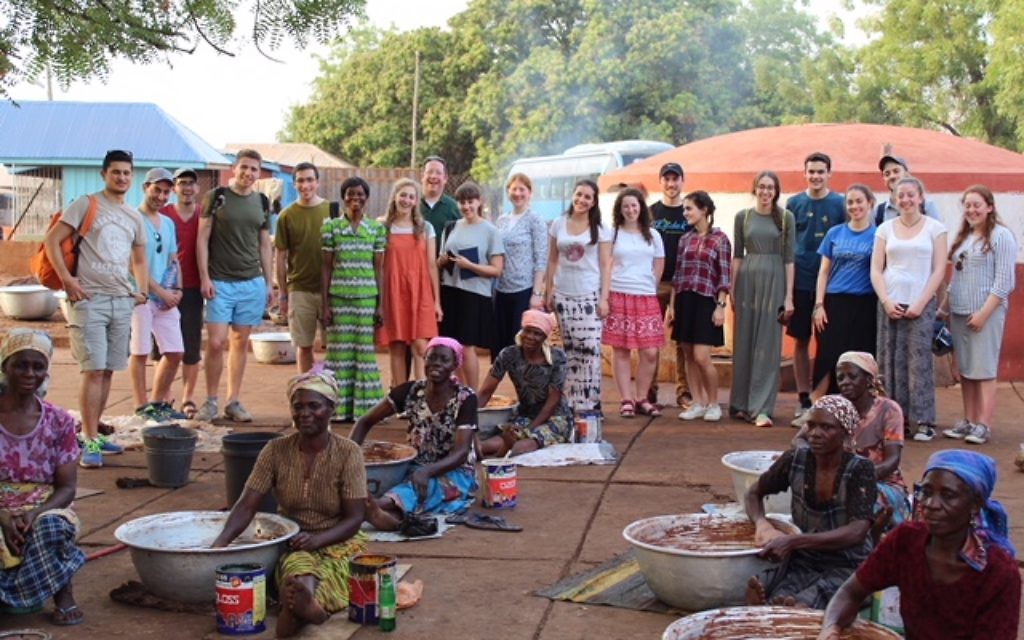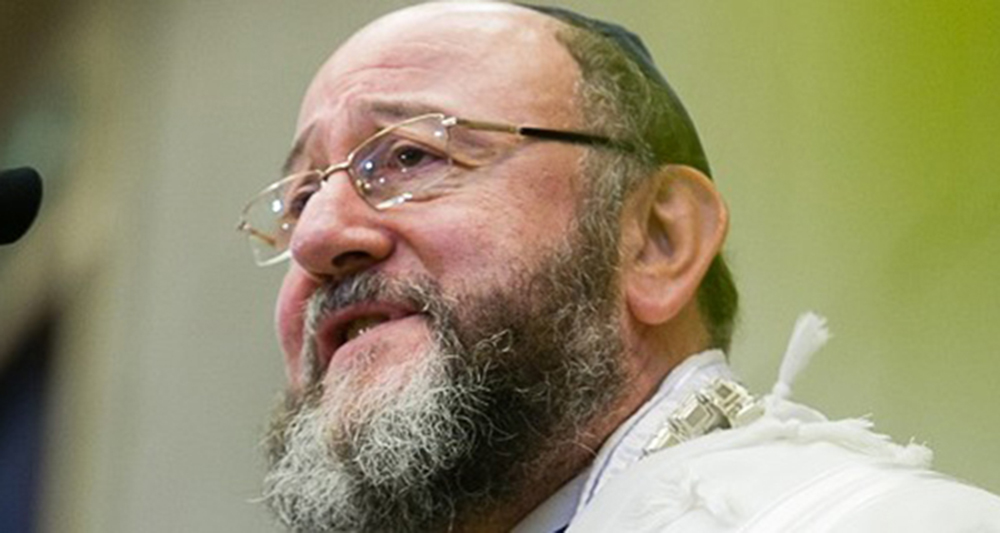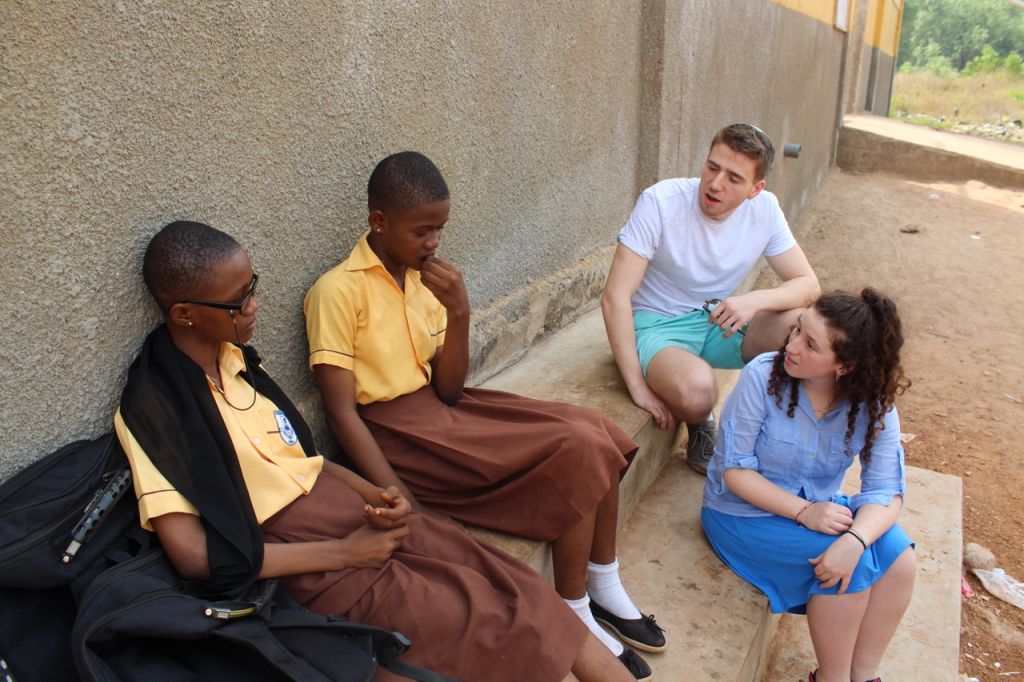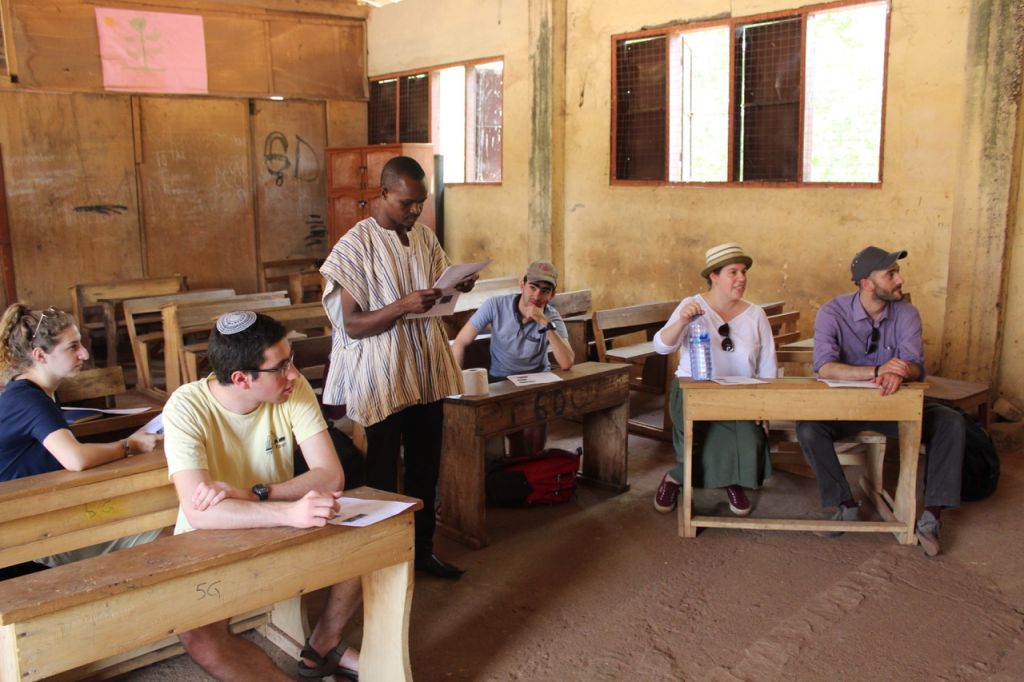Chief Rabbi and Tzedek send students to Ghana to learn social responsibility
High-achieving youngsters spend an immersive week in West Africa learning about widespread challenges faced in Ghana on the Ben Azzai project.

One by one, the cheerful rowdy voices of 16 high-achieving Jewish students quietened down as they came face-to-face with some of the shocking realities of the developing world.
Lauren Keiles, a student reading international relations at the University of Leeds, put it succinctly: “Tikkun Olam (the principle of ‘saving the world’)” is such an important part of my Judaism.”
And now, after an immersive week listening and learning about the widespread challenges faced in Ghana — from health and education deprivation, to the legacy of the horrors of slavery, or simply the extreme poverty of much of the country — Lauren and the class of 2017 are returning to Britain to raise awareness of the necessity of social responsibility.
Get The Jewish News Daily Edition by email and never miss our top stories Free Sign Up
The 16 students are this year’s cohort of a unique programme initiated by Chief Rabbi Ephraim Mirvis, the Ben Azzai project. Last year’s pilot event took a group to India and this year, in partnership with Tzedek, the leading Jewish social action charity, a new group of students travelled to Ghana, where Tzedek has been working for the last 25 years.
The Chief Rabbi launched Ben Azzai to back up his belief that “being socially responsible is part of who we are as engaged, outward-facing Jews,” and that such responsibility has to broaden beyond immediate Jewish concerns and extend to humanity at large.

Speaking to Jewish News, Chief Rabbi Ephraim Mirvis said: “All of us have a responsibility to ask what we want the next generation of the Jewish community to look like and I believe that our Ben Azzai programme is part of the answer to that question.”
“From last year’s cohort we have already seen the kind of impact that a small group of passionate and committed young people can have on their peer groups and communities. I have no doubt that the investment we are making in these outstanding students will bear fruit, not just over the coming years, but for the rest of their lives.”
“I feel most proud of my Judaism when I see Jewish-led examples of social action. It’s a very powerful part of my religion that we make a positive contribution. I feel least proud and most ashamed to be Jewish when it expresses itself introspectively”.
And it is a view enthusiastically embraced by the rabbinical mentor of the programme, Rabbi Daniel Epstein of Cockfosters and North Southgate Synagogue, who, with his wife Ilana, (the United Synagogue educator and self-described “Accidental Rebbetzin”) provided the Judaism “spine” to the sights and events viewed by the students.
What did Rabbi Epstein think the students would get out of the programme? “In the simplest terms, to get so far out of their comfort zone that everything they assumed was the way the world works is now challenged. Nothing is to be taken for granted — and you need something as powerful as this to reassess your own life, so that when you come back to the UK, it’s reassessing your relationship with God and your community”.

He acknowledged it was sometimes a hard concept to sell to the Jewish community, even some members of his own congregation, a view echoed by some of the students. George Rosenfeld, in his first year at Trinity College, Cambridge, reading Russian and Arabic, said: “I feel most proud of my Judaism when I see Jewish-led examples of social action. It’s a very powerful part of my religion that we make a positive contribution. I feel least proud and most ashamed to be Jewish when it expresses itself introspectively”.
Another Cambridge student, Jordana Price, was also conscious of the perception by her non-Jewish contemporaries that “Jews only help Jews. There is little or no awareness that Jewish society works for non-Jews, too, in many parts of the world”. And she added that one of the reasons that she had been keen to participate in the Ben Azzai programme was “a way of taking myself out of the whole Israel debate. I don’t know everything about Israel but sometimes we [Jewish students] are seen to be able to argue about Israel and have all the answers. So social action enables you to have a much more active role without people trying to work out a way to floor you”. Her hope for the programme was that she would return home “being able to see the bigger picture”.

Many of the students, such as Lauren Keiles, who has volunteered in rural Fiji, or Ayelet Besso-Cowan, a nursing student at City University who has worked at an after-school club for Somali refugees, or Dov Boonin, an Oxford PPE undergraduate who has run summer camps in Shanghai schools, have had encounters with the developing world already, although the majority had had experience of volunteer and youth leadership programmes in Israel.
“…In a society where men can have anything between four and 12 wives — some community chiefs have 20 wives — there can be resulting multiple siblings, few of whom get the opportunity to be in the classroom, even at primary school level..”
But little can have prepared them for the harsh realities of African life, where circular mud huts with thatched roofs nudge half-built buildings along the side of potholed roads, where goats wander freely and the roadsides are littered with signs exhorting people to attend this or that church or mosque.
Tzedek’s meticulously prepared programme, devised by its country director Genna Barnett together with Ben Salomon, set the scene by taking the group to a slavery museum in Accra, followed by a visit to the Kwame Nkrumah Memorial Park and Mausoleum, which commemorates the life and works of the country’s first prime minister and president after Ghana achieved independence from Britain in 1957. (The following year, to mark Nkrumah’s birthday, David Ben-Gurion sent him the gift of a two-seater Piper Cub plane, a gesture marking a strong relationship between Israel and Ghana, which flourishes today.)
But it was once the group got to Tamale, in the north of Ghana, that the programme really caught fire, with an emphasis on learning about women and children. Women traditionally have had a rough deal in many countries in Africa, but with partnerships with NGOs and organisations such as Tzedek, there is a gradual and largely successful bid to overcome their lack of education or ability to support themselves and their children. Two of the most successful projects are the Village Savings and Loans Association, which at its most basic is a strongbox with three padlocks, enabling women to save and lend small sums of money; and the Shea Butter co-operatives, in which women gather together to make — in the most primitive of conditions — the coveted cosmetic cream which sells at high prices in the West.
In a society where men can have anything between four and 12 wives — some community chiefs have 20 wives — there can be resulting multiple siblings, few of whom get the opportunity to be in the classroom, even at primary school level. As one lecturer, Ibrahim Sebiyam, regional training officer of the Northern Region of the Ghana Education Service, put it: “Universal primary education is compulsory — but it’s not well enforced”. All too often there is no money to send the kids to school, to provide them with uniforms or books. And that imperative to educate the children is even lower when it comes to girls, too frequently caught up in a cycle of early teenage pregnancies or drafted in as extra labour for their families.
A real success story is School for Life, one of Tzedek’s main partners in the Northern Region. Karimu Alhassan Mohammed is the curriculum development director at School for Life, which has successfully brought back more than 3,000 children from remote rural districts into the school system. The children are taught in their own language, Dagbani, as well as English; and Tzedek has twinned 12 Ghanaian primary schools with 12 Jewish primary schools in London and Essex.

But while the pedagogical methods may be bang up to date, the conditions are heartbreaking. The school classrooms are rusting sheds and the desks are Dickensian pews. Each class can consist of around 120 children, a scale unthinkable in the First World. The kids are almost literally sitting in each other’s laps — but they are keen to learn.
After a day spent with 16 youth leaders in the northern district of Nyankpala, the group returned to Accra and were due to meet Israel’s ambassador to Ghana, Ami Mehl, to learn about Jewish and Israeli development initiatives across the country. The increasing presence of Israelis in Ghana has led to the establishment of a much-admired Chabad House in Accra, the focus for any Jewish visitor to the capital.
And Chabad, and the presence of Rabbi and Mrs Epstein, and the Chief Rabbi’s initiative itself, strikes an unusual note. For it is far more usual in Britain for social action projects to be undertaken by Progressive Jews, and much less by the Orthodox. Yet the thinking behind Ben Azzai is to make the largely observant students (although the programme is open to Jewish students across the religious spectrum) become ambassadors both inside and outside the community.
Sule Mohammed set up the Nfasimdi Development Association, one of Tzedek’s oldest partners in the northern region. He is a youth chief who charmed the students by showing them how he dances; and, in turn, the students charmed Sule by multiple candle-lighting for the last night of Chanukah. It was the perfect blend of the two cultures: and a picture which will stay in the mind for a long, long time.

Thank you for helping to make Jewish News the leading source of news and opinion for the UK Jewish community. Today we're asking for your invaluable help to continue putting our community first in everything we do.
For as little as £5 a month you can help sustain the vital work we do in celebrating and standing up for Jewish life in Britain.
Jewish News holds our community together and keeps us connected. Like a synagogue, it’s where people turn to feel part of something bigger. It also proudly shows the rest of Britain the vibrancy and rich culture of modern Jewish life.
You can make a quick and easy one-off or monthly contribution of £5, £10, £20 or any other sum you’re comfortable with.
100% of your donation will help us continue celebrating our community, in all its dynamic diversity...
Engaging
Being a community platform means so much more than producing a newspaper and website. One of our proudest roles is media partnering with our invaluable charities to amplify the outstanding work they do to help us all.
Celebrating
There’s no shortage of oys in the world but Jewish News takes every opportunity to celebrate the joys too, through projects like Night of Heroes, 40 Under 40 and other compelling countdowns that make the community kvell with pride.
Pioneering
In the first collaboration between media outlets from different faiths, Jewish News worked with British Muslim TV and Church Times to produce a list of young activists leading the way on interfaith understanding.
Campaigning
Royal Mail issued a stamp honouring Holocaust hero Sir Nicholas Winton after a Jewish News campaign attracted more than 100,000 backers. Jewish Newsalso produces special editions of the paper highlighting pressing issues including mental health and Holocaust remembrance.
Easy access
In an age when news is readily accessible, Jewish News provides high-quality content free online and offline, removing any financial barriers to connecting people.
Voice of our community to wider society
The Jewish News team regularly appears on TV, radio and on the pages of the national press to comment on stories about the Jewish community. Easy access to the paper on the streets of London also means Jewish News provides an invaluable window into the community for the country at large.
We hope you agree all this is worth preserving.
- Features
- Chief Rabbi Ephraim Mirvis
- Ben Azzai project
- Tzedek
- Ghana
- tikkun olam
- News Features
- Special report
- Rabbi Daniel Epstein
- Cockfosters and North Southgate Synagogue
- Judaism
- Students
- Interfaith
- Nfasimdi Development Association
- Accra
- Nyankpala
- Ami Mehl
- Israel-Africa relations
- Israel-Ghana relations
- Ghana-Israel relations
- News
-
By Brigit Grant
-
By Laurent Vaughan - Senior Associate (Bishop & Sewell Solicitors)
-
By Laurent Vaughan - Senior Associate (Bishop & Sewell Solicitors)
-
By Laurent Vaughan - Senior Associate (Bishop & Sewell Solicitors)
-
By Laurent Vaughan - Senior Associate (Bishop & Sewell Solicitors)





















